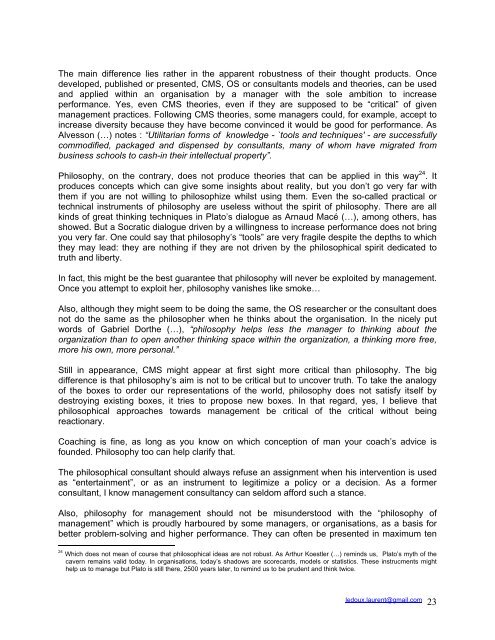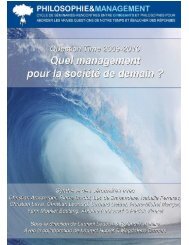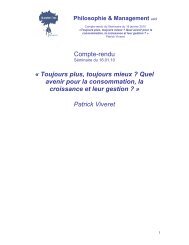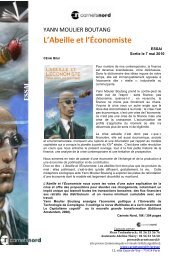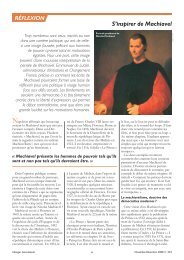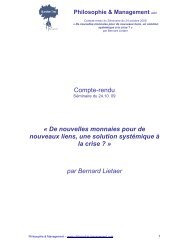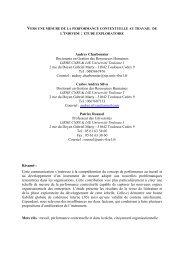Philosophy: The Managers - Philosophie Management
Philosophy: The Managers - Philosophie Management
Philosophy: The Managers - Philosophie Management
You also want an ePaper? Increase the reach of your titles
YUMPU automatically turns print PDFs into web optimized ePapers that Google loves.
<strong>The</strong> main difference lies rather in the apparent robustness of their thought products. Once<br />
developed, published or presented, CMS, OS or consultants models and theories, can be used<br />
and applied within an organisation by a manager with the sole ambition to increase<br />
performance. Yes, even CMS theories, even if they are supposed to be “critical” of given<br />
management practices. Following CMS theories, some managers could, for example, accept to<br />
increase diversity because they have become convinced it would be good for performance. As<br />
Alvesson (…) notes : “Utilitarian forms of knowledge - `tools and techniques' - are successfully<br />
commodified, packaged and dispensed by consultants, many of whom have migrated from<br />
business schools to cash-in their intellectual property”.<br />
<strong>Philosophy</strong>, on the contrary, does not produce theories that can be applied in this way 24 . It<br />
produces concepts which can give some insights about reality, but you don’t go very far with<br />
them if you are not willing to philosophize whilst using them. Even the so-called practical or<br />
technical instruments of philosophy are useless without the spirit of philosophy. <strong>The</strong>re are all<br />
kinds of great thinking techniques in Plato’s dialogue as Arnaud Macé (…), among others, has<br />
showed. But a Socratic dialogue driven by a willingness to increase performance does not bring<br />
you very far. One could say that philosophy’s “tools” are very fragile despite the depths to which<br />
they may lead: they are nothing if they are not driven by the philosophical spirit dedicated to<br />
truth and liberty.<br />
In fact, this might be the best guarantee that philosophy will never be exploited by management.<br />
Once you attempt to exploit her, philosophy vanishes like smoke…<br />
Also, although they might seem to be doing the same, the OS researcher or the consultant does<br />
not do the same as the philosopher when he thinks about the organisation. In the nicely put<br />
words of Gabriel Dorthe (…), “philosophy helps less the manager to thinking about the<br />
organization than to open another thinking space within the organization, a thinking more free,<br />
more his own, more personal.”<br />
Still in appearance, CMS might appear at first sight more critical than philosophy. <strong>The</strong> big<br />
difference is that philosophy’s aim is not to be critical but to uncover truth. To take the analogy<br />
of the boxes to order our representations of the world, philosophy does not satisfy itself by<br />
destroying existing boxes, it tries to propose new boxes. In that regard, yes, I believe that<br />
philosophical approaches towards management be critical of the critical without being<br />
reactionary.<br />
Coaching is fine, as long as you know on which conception of man your coach’s advice is<br />
founded. <strong>Philosophy</strong> too can help clarify that.<br />
<strong>The</strong> philosophical consultant should always refuse an assignment when his intervention is used<br />
as “entertainment”, or as an instrument to legitimize a policy or a decision. As a former<br />
consultant, I know management consultancy can seldom afford such a stance.<br />
Also, philosophy for management should not be misunderstood with the “philosophy of<br />
management” which is proudly harboured by some managers, or organisations, as a basis for<br />
better problem-solving and higher performance. <strong>The</strong>y can often be presented in maximum ten<br />
24<br />
Which does not mean of course that philosophical ideas are not robust. As Arthur Koestler (…) reminds us, Plato’s myth of the<br />
cavern remains valid today. In organisations, today’s shadows are scorecards, models or statistics. <strong>The</strong>se instrucments might<br />
help us to manage but Plato is still there, 2500 years later, to remind us to be prudent and think twice.<br />
ledoux.laurent@gmail.com<br />
23


